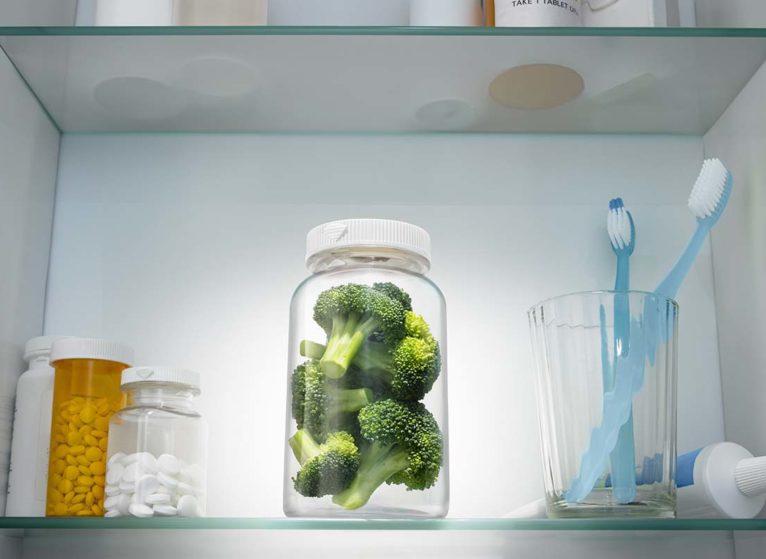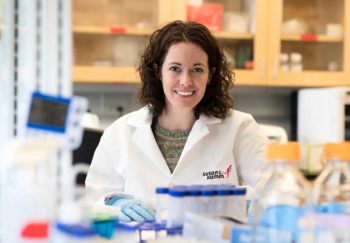It was several months into her treatment for breast cancer that my mom began researching “miracle foods.” The chemotherapy had done a number on her hair. It made her hands and feet tingle and shed layers of skin. Her mouth was riddled with painful sores. But unfortunately, the drug concoction didn’t seem to be having any effect on the cancer.
So we went on the hunt for a particular type of mushroom. She filled the fridge with all kinds of berries, and cut back on ice cream, her favorite treat. Embracing the idea of food as medicine — adding “healthy diet” to her long list of cancer-fighting strategies — was worth a shot, she figured.
Can Food Cure Cancer?
My mom’s faith in food wasn’t entirely off base. Research shows it’s possible to lower your risk of cancer by as much as 20% with a healthy diet. But, could eating the right foods actually cure cancer?
Side Effects From Cancer?
At UVA Cancer Center, we have a wide variety of support services to help with stress and side effects, including nutrition support.
I turned to UVA Health registered dietitian and certified oncology specialist Carole Havrila for more information about the potential of food as medicine in cancer treatment. She stressed one key point right from the start.
“No food or diet can cure cancer,” she says. “But diet, as part of a healthy lifestyle, can make a huge difference in reducing your risk.”
How Does Diet Impact Cancer Risk?
Some cancers are more closely linked to diet than others. Research has shown that certain foods are cancer-causing. For example, eating lots of red and/or processed meat is a known risk factor for colorectal cancer. But when we look at cancers that are on the rise, it’s not specific foods that are to blame. Rather, it’s obesity that seems to be tipping the scales. In fact, cancers associated with obesity make up 40% of all cancers in the U.S. each year.
“We know that obesity is linked to about 13 different cancers,” says Havrila. “Having excess weight creates an environment where there are too many circulating hormones, increasing inflammation and making the body more susceptible to disease. Obesity is a country-wide problem. It is increasing our risk for cancer, but also for other diseases like heart disease and diabetes.”
What Role Does a Healthy Diet Play In Cancer Prevention?
With the statistics above in mind, we know that keeping your weight in check is key to cancer prevention. But there’s more to it than that. A healthy diet also gives your body the nutrients it needs to fight off disease.
More Veggies, Less Meat
The American Institute for Cancer Research (AICR) introduced the New American Plate last year. It’s a diet based on their research on cancer prevention. Here’s what these cancer-fighting experts recommend for every meal:
- 1/3 of your plate (or less) should be animal proteins, which include dairy and meats
- 2/3 of your plate should be vegetables, fruits, whole grains, and beans
- Limit red meat, processed foods, sugar, and alcohol
- Avoid tobacco in all forms
“We encourage our patients to eat a plant-based diet,” says Havrila. “We don’t want them to make meat the centerpiece of a meal anymore. You can find a litany of protective compounds in fruits and vegetables. There are vitamins, minerals, phytochemicals, fiber, and antioxidants all in one package to help prevent and protect you from chronic disease.”
This good-for-you combo of vitamins, minerals, etc. is why some call foods like kale and blueberries “miracle foods.” Want to learn more? The AICR has a great tool that explains what makes some foods better than others when it comes to fighting cancer. This can help you plan meals that have plenty of foods you need and few of the foods you don’t.
Do You Need to Buy Organic?
There are a host of reasons people opt for organic over conventional produce. But when it comes to your health, what matters is that you’re eating fruits and vegetables, not necessarily where they came from.
“I never discourage patients from eating organic. But I will say to them that the benefits they’re getting from fruits and vegetables are the same in conventional produce. There’s not a lot of data showing that organics give you more protection against diseases. For some, it’s an issue of cost. They can’t afford to buy organic. So my takeaway is, if you wash fruits and veggies well and prepare them normally, then the benefits of conventional produce is just as good as organic.”
Does Sugar Speed Up Cancer Growth?
This is a common misconception, says Havrila. “There’s so much misinformation online. A lot of what we do is steer patients to credible, evidence-based resources, so they don’t get caught up in the fear: ‘If I put a cookie in my mouth, am I feeding cancer?’”
There is no evidence that sugar speeds cancer growth, she adds. What sugar does, however, is increase your risk for obesity, which can lead to cancer.
“The American Institute of Cancer Research does not provide a recommendation for specific servings per day in terms of sugar. Their recommendation is to limit sugary beverages. And if you want to have sweets, have something once a day. That’s different from having sugar at every meal: sugar cereal, sugar in your coffee and sodas. Take a look at what you’re eating throughout the day and see how you might cut back or cut out the sugar.”
How Does Nutrition Fit Into Cancer Treatment?
Although we can’t rely on diet alone to cure cancer, proper nutrition is critical for people fighting disease. The right foods can improve strength, boost the immune system, and help patients manage the side effects of treatment. This is why UVA Cancer Center makes dietitians available at every stage of treatment, so you can use food as medicine.
“All cancer patients have access to our nutritionists. We screen patients for malnutrition, so patients who are having issues with weight loss may get a referral. But our services are available to all cancer patients anytime they need support,” says Havrila.
Food as Medicine: Combatting Side Effects of Cancer Treatment
Dietitians like Havrila, who specialize in caring for cancer patients, use food as medicine — not to cure disease, but to help people manage challenging side effects.
Fatigue
Dehydration can make people feel tired, so increasing fluid intake may help. Havrila says she also makes sure patients are getting enough protein. “Meat doesn’t always taste good, so we look for alternative ways to get protein in their diet,” she says.
Weight Loss
Chemotherapy and other treatments often impact appetite, so Havrila recommends eating calorie-dense, healthy fats like peanut butter and avocado throughout the day.
Nausea & Diarrhea
Foods that are bland and easy to digest (crackers, rice, canned fruits) are easier to tolerate when patients have nausea or diarrhea. They should avoid fried, fatty foods, and sweets like candy or cake.
Mouth Sores
Mouth sores can make eating painful, so Havrila works with cancer patients to find foods they can tolerate. “Some people love spicy foods, but they can’t eat them when they have mouth sores. We brainstorm together so they don’t have to cut out things they love,” she says.
It’s important for cancer patients to talk to a dietitian or nutritionist before making changes to their diet, Havrila adds. This is especially true if you're thinking about taking herbs or supplements.
“We get a lot of questions about herbs and supplements that are immune-stimulating,” she says. “In some cases, these have potential to interfere with treatment, so we need to know what medications are you taking, what the treatment plan is. We may need to work with the pharmacist to evaluate interactions.”
Why Is a Healthy Diet Important for Cancer Survivors?
When cancer goes into remission or disappears, most survivors become hypervigilant when it comes to living a healthy lifestyle. “Cancer is a defining moment for many,” says Havrila. “A lot of people make lifelong changes after their diagnosis. There’s a lot of angst — they don’t want the cancer to come back.”
But there is no special diet for survivors. The nutrition recommendations are the same. “We recommend the same guidelines that you should follow for cancer prevention,” says Havrila.
No Quick Fix
Putting your faith in food — embracing the idea of food as medicine — isn’t a bad thing. Good nutrition is a critical part of a healthy lifestyle. But eating healthy is not a quick fix or miracle cure for cancer or any other disease. You have to play the long game to keep your body well. Eat right. Move more. Take care of you.

